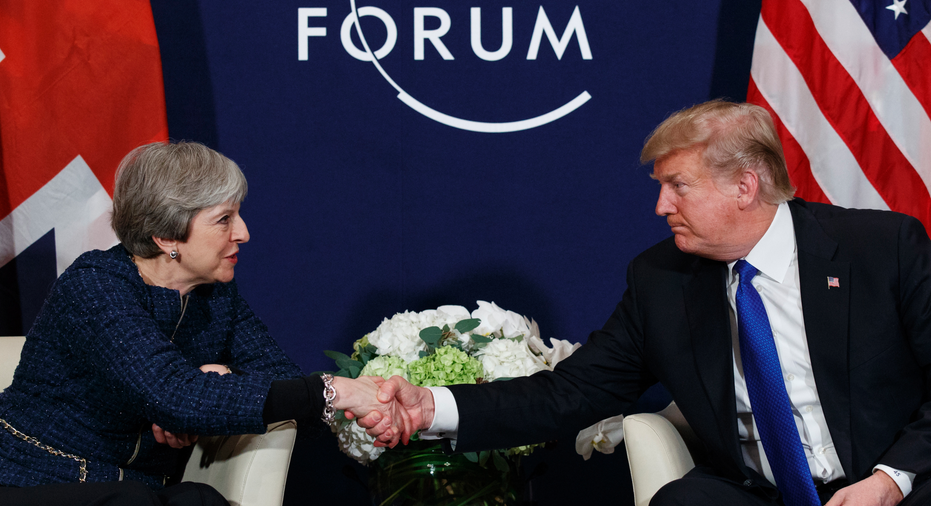With Trump meeting, May looks to keep UK on global map

DAVOS, Switzerland – British Prime Minister Theresa May sought to reaffirm her country's central role in world affairs on Thursday, when she delivered a speech to the World Economic Forum and met with President Donald Trump to dispel any perceptions of tensions between them.
May came to the gathering of the global elites in Davos, Switzerland, amid questions about whether Britain could lose influence on the world stage after it leaves the European Union and doubts about the strength of the relationship with the U.S.
Her meeting with Trump appeared to be an effort by both sides to solidify a relationship that has come under strain. Trump and May last year traded criticism over Trump's tweets of a U.K. far-right group's anti-Muslim videos and Trump canceled a trip to London for the opening of a new U.S. embassy.
After the meeting, May said the "special relationship" between the U.S. and U.K. continues. Trump said he and May have a "really great relationship, although some people don't necessarily believe that.
As though to put to bed any tensions about Trump's canceled visit, the two sides agreed to plan a Trump visit to London later this year.
Britain is hoping on good relations with the U.S. to offset somewhat the weaker commercial relations it will have with the EU, a bloc that guarantees no barriers to trade, money or people between its members.
With an eye to the future, May used her speech earlier to focus on Britain's desire to lead in technologies that are already causing profound change.
"The message of our industrial strategy to the world is clear: Britain will be one of the best places in the world in which to start and grow a business," she said.
She also stressed the need to do so in a manner that is fair to society.
She highlighted how modern technology giants like Google and Alibaba were changing the lives of billions of people, but that new technology is also threatening ways of life and jobs. She said government and business both need to help retrain people.
"We need to act decisively to help people benefit from global growth now," she said.
Britain's economy, once one of the fastest in the developed world, is now among the slowest. Some companies are worried of losing access to the EU's single market after Brexit in March 2019.
Earlier, U.S. Treasury Secretary Steven Mnuchin said that the U.S. is ready to negotiate an "attractive" trade deal with Britain once the country has left the EU.
While within the EU, the U.K. cannot negotiate separate trade deals with other countries. Mnuchin said that once the "U.K. is ready, we are prepared to negotiate an attractive trade deal." He added that Trump has already said Britain will be at the "front of the line" in trade negotiations.
As Britain prepares to negotiate its future relations with the EU, its Treasury chief, Philip Hammond, said that any post-Brexit trade deal with the bloc would have to cover services — particularly finance, a big and lucrative sector for Britain.
"A deal which included goods but did not include services could never be fair. It could never be attractive to the U.K.," he said during a panel in Davos.
The EU does not want to give Britain unfettered access to its single market if it does not also accept free movement of people, among other conditions. The Brexit vote was based in part on a promise to limit EU immigration, so the negotiation on a new trade deal between the EU and Britain is expected to be difficult.
The Davos forum was otherwise dominated by Trump's arrival, with the president saying that his message for the forum was "peace and prosperity." Trump then also met with Israeli Prime Minister Benjamin Netanyahu and threatened to withhold aid money from the Palestinians until they return to peace talks with Israel.
Trump's decision last year to recognize Jerusalem as Israel's capital roiled Arab nations and led Palestinians to withdraw from negotiations on the grounds the U.S. can no longer be trusted as an honest broker in the quest for peace.
Trump said that decision has consequences. The U.S., he said, gives "hundreds of millions of dollars" to the Palestinians, and "that money is on the table and that money's not going to them unless they sit down and negotiate peace."
___
Catherine Lucey and Theodora Tongas in Davos contributed to this report.



















